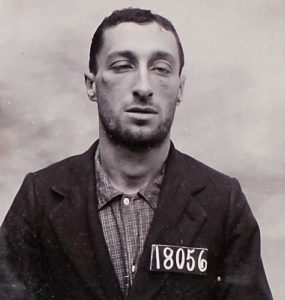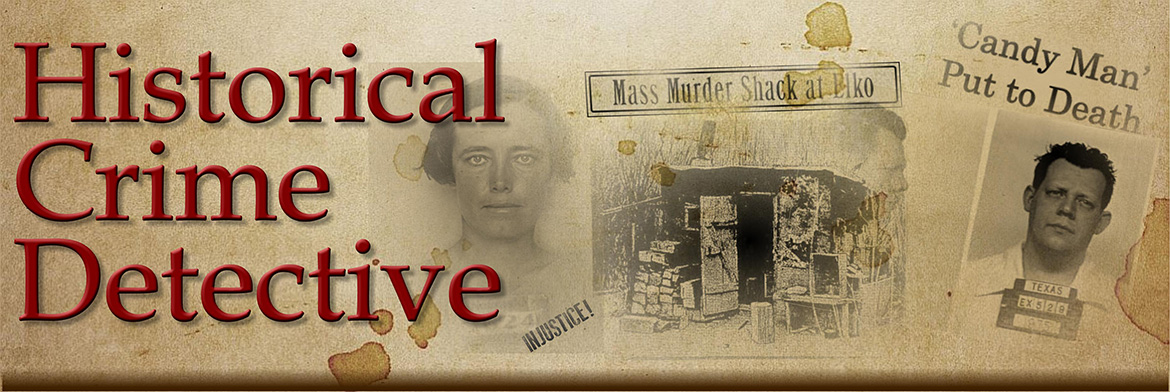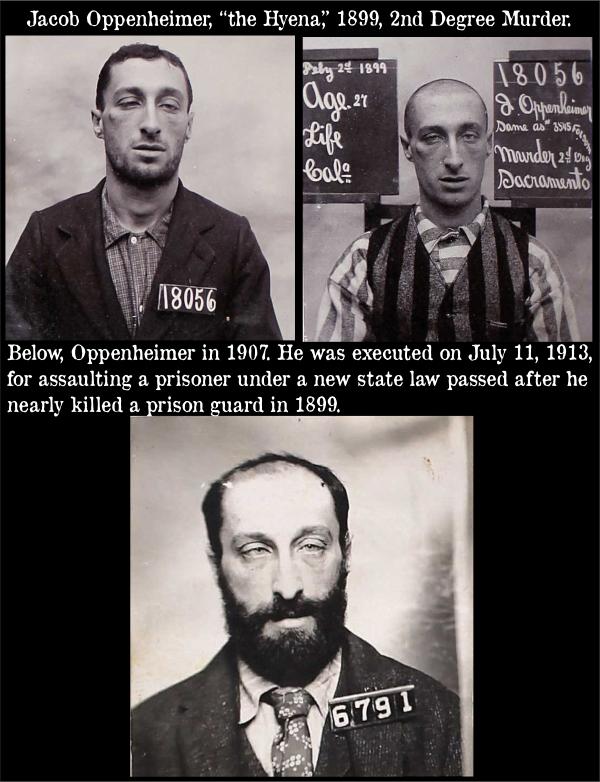Jacob “the Hyena” Oppenheimer, Executed in 1913.
Story by Thomas Duke, 1910
“Celebrated Criminal Cases of America”
Part II: Pacific Coast Cases
 Jacob Oppenheimer was formerly a messenger boy for the American District Company in San Francisco, and was noted for his depraved habits. After being dismissed from the service in 1889, he engaged in a row with Manager Wehe, during which he attempted to cut Wehe’s throat. For this crime he was sent to the House of Correction for eighteen months.
Jacob Oppenheimer was formerly a messenger boy for the American District Company in San Francisco, and was noted for his depraved habits. After being dismissed from the service in 1889, he engaged in a row with Manager Wehe, during which he attempted to cut Wehe’s throat. For this crime he was sent to the House of Correction for eighteen months.
On the night of May 1, 1892, he and a man named Lawless entered the telegraph office on Sutter near Leavenworth Street, and held up the clerk. They both wore masks and were armed with revolvers. After threatening to kill Clerk John Monahan if he made an outcry, they compelled him to open the safe and deliver its contents, and they then disappeared.
On the night of June 11, 1895, Oppenheimer and two brothers named Walter and Charles Ross, held up and robbed John McIntosh, a saloonkeeper at McAllister and Leavenworth Streets, and obtained a small amount of money. Charles Ross was the only one of the trio convicted for this crime, and he was sentenced to serve fifteen years at San Quentin.
In September, 1895, Walter Ross was living with a woman named Grace Walls in a Morton-Street house. Learning that the woman intended to leave him, he went to her den, choked her almost to death, and robbed her of a sealskin sacque, jewelry and $150.00 in coin. He was arrested, found guilty and in November, 1895, was sentenced by Judge Wallace to serve twenty-five years in Folsom.
In June, 1895, Oppenheimer and Berry Harland committed a brutal robbery in the outskirts of Oakland. For this crime, Oppenheimer was sentenced in August 1895, to serve fifty years at Folsom and Harland was sentenced to life imprisonment at the same institution.
Oppenheimer believed that the Ross boys had betrayed him, and as Walter Ross was in the same prison with him he never missed an opportunity to express his hatred toward him. On September 30, 1898, as the prisoners were standing in line waiting for the door leading to the dining-room to open, Oppenheimer caught sight of Walter Ross, who was in the same line. He walked up behind him, threw his arm around his neck and whipping out a knife he had made out of a file, stabbed Ross several times, inflicting wounds which caused him to die within an hour.
He was charged with murder, convicted and sentenced to life imprisonment, which seemed a farce in view of the fact that he was at the time serving a fifty-year sentence. He was then removed to San Quentin.
On May 15, 1899, while working in the jute mill he committed a violation of the rules, for which Guard James McDonald reported him to W. D. Leahy, chief guard of the jute mill. The next day McDonald caught him violating the same rule [sexual assault?], and taking him by the arm said: “You denied that I caught you yesterday so I intend to prove that I was right this time.”
McDonald was forced to drag Oppenheimer, when suddenly the latter drew a knife with a blade eight inches long, which he had made in the prison, and drove it into the guard’s breast to the hilt. He withdrew it and then drove it in again near the heart. McDonald dropped to the floor and when the next assault was made he grasped the blade, but Oppenheimer pulled it away from him and in drawing it through McDonald’s hand almost cut several of his fingers off. He continued to butcher the prostrate guard until Guard Samuel Yoho rushed up and knocked Oppenheimer senseless with a cane. McDonald staggered to his feet and made a rush at Oppenheimer but was restrained.
Assisted by two guards McDonald walked to the operating room with the blood rushing from his wounds as he advanced. When he was stripped and the extent of his injuries discovered it was considered a miracle that he did not die instantly. There were seven wounds on his body and the air whistled through one gaping wound in his chest, which had penetrated his lung, every time he drew a breath. But he finally recovered and the only additional punishment which could be inflicted on Oppenheimer was solitary confinement.
His last assault, however, resulted in the Legislature adding section 248 to the Penal Code, which makes it a crime punishable by death for a convict serving a life sentence to assault any person with intent to produce great bodily injury.
Oppenheimer was placed in one of the strongest and most closely-guarded cells in the prison, from which it was thought no human being could escape. Here he remained like a caged tiger until about 4:30 p. m., August 14, 1907, at which time his guard, Manuel Silveira, stepped away a few feet to wash his hands. As if by magic, the bars fell away, Oppenheimer rushed out and fled to the prison kitchen. Here he encountered convict George Wilson, who was in the act of cutting bread. After a struggle, Oppenheimer obtained the knife and stabbed Wilson in the arm and hand. Wilson’s cries caused the guards to rush upon Oppenheimer, and after a terrific struggle he was overpowered.
It was then learned that he had, in some mysterious manner, obtained possession of a sack needle, and with a patience and persistence seldom found outside of fiction, ground it until he had formed it into a saw, and then for months sawed on the bars at every opportunity, until he had cut six bars, each two and one-half inches wide and one-half inch thick. He stated that all this was done for the purpose of killing a convict named Jack O’Neil, who was serving thirty-five years for a burglary committed in Sacramento, Oppenheimer claiming that on one occasion O’Neil betrayed him.
Oppenheimer was the third prisoner tried for the violation of the law passed because of his assault upon Guard McDonald. He was convicted and sentenced to be hanged, but the case was appealed to the Supreme Court on the grounds that the law under which he was convicted was unconstitutional inasmuch as it was an unusual punishment to hang a man for an assault to commit murder.
The Supreme Court, however, declared that the constitutionality of the law had already been determined by that tribunal in the cases of Inijada and Carson, two convicts who committed assaults while attempting to escape from Folsom prison with “Redshirt” Gordan and others.
Oppenheimer’s case is now on appeal to the United States Supreme Court. He has addressed a communication to the Legislature in which he attributes his downfall to the fact that as a messenger boy he visited dance halls and rooms where opium smokers were secretly congregated, and he advocated the passage of a law prohibiting “boys” under the age of twenty-one from serving as messenger boys.
Editor’s Note: Jacob Oppenheimer was executed on July 11, 1913.




